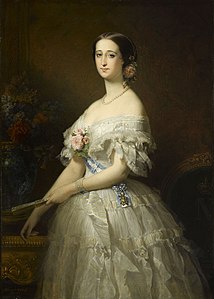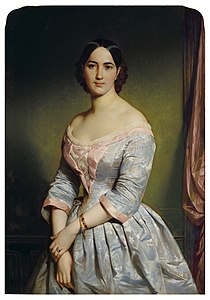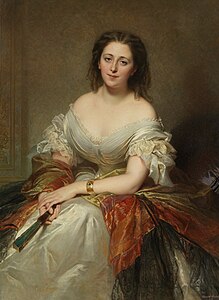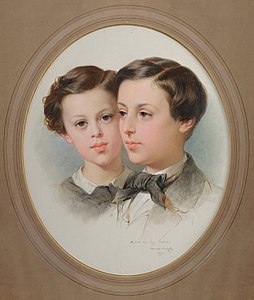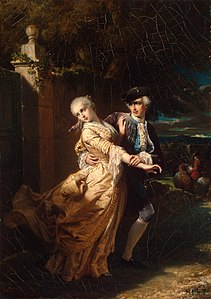Édouard Dubufe
This article needs additional citations for verification. (December 2014) |
Édouard Dubufe | |
|---|---|
École des Beaux-arts | |
| Known for | Painter (portraits) |
Édouard Louis Dubufe (French pronunciation: [edwaʁ lwi dybyf]; 31 March 1819 – 11 August 1883) was a French portrait painter.
Biography

Dubufe was born in Paris. His father was the painter
In 1842, he married Juliette Zimmerman (the daughter of composer and pianist Pierre-Joseph-Guillaume Zimmerman) who was a sculptor. The composer Charles Gounod became Édouard's brother-in-law (and lifelong friend) when he married Juliette's sister Anna.[2] During a stay in England, from 1848 to 1851, Dubufe discovered the great English portrait painters, who he would seek to emulate.
His official career as a portrait painter began in 1853 with portrayals of Emperor
Dubufe continued to enjoy great success with the aristocracy, receiving a commission from the Emperor to paint the Congress of Paris in 1856.[1] Later, the Empress asked for his assistance in decorating her "Salon Bleu" at the Tuileries Palace. In April 1866, the journal L'Événement ran an article by Émile Zola that criticized Dubufe's qualifications for acting as a judge at the Salon and suggested that he belonged to academic cliques that compromised his judgment.[3]
That same year, Dubufe remarried. He died in
Works
-
Eugénie de Montijo, Empress of the French, represented in a ball gown, 1844
-
Anne-Arsene Charton, 1849
-
Jean Frédéric André Poupart, Baron de Neuflize, and his brother, 1859
-
Lovelace Abducting Clarissa Harlowe, 1867
-
Prince Vincenzo Ruffo and his children, 1852
References
Further reading
- Emmanuel Bréon, Claude-Marie, Édouard et Guillaume Dubufe: Portraits d'un siècle d'élégance parisienne, Délégation à l'action artistique de la Ville de Paris, 1988 ISBN 2-905118-15-6
External links
![]() Media related to Édouard Dubufe at Wikimedia Commons
Media related to Édouard Dubufe at Wikimedia Commons
- Works by or about Édouard Dubufe at Internet Archive
- ArtNet: More works by Dubufe
- . New International Encyclopedia. 1905.

